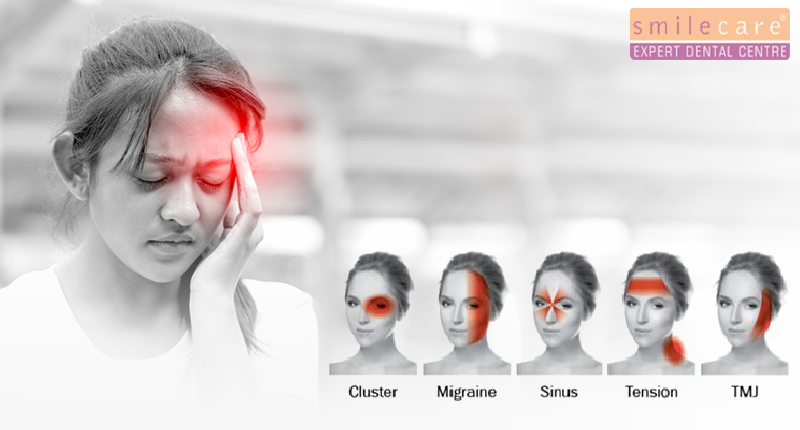Headaches are common and affect millions of individuals worldwide. However, while headaches can be triggered by various factors, one often overlooked cause is a temporomandibular joint (TMJ) disorder.
Acting as a sliding hinge, the TMJ muscles connect the jaw to your skull. It is crucial for everyday activities such as talking, chewing, and yawning. When the TMJ is under stress or experiences dysfunction, it can lead to various symptoms, including headaches.
Understanding the signs that your headache might be linked to a TMJ disorder is crucial for proper diagnosis and treatment. But before that, let’s learn TMJ disorder causes, in case of headache, in brief.
TMJ Headache Reasons
Independent studies state that 1 in 10 people suffers from TMJ pain. Currently, there are no such statistics about TMJ headaches, as it’s hard to differentiate between general headaches and TMJ headaches.
As a matter of fact, the TMJ muscles also run through your jaws and cheeks. Tension in these muscles, often due to teeth grinding, can lead to pain that extends to other muscles associated with the temporomandibular joint (TMJ), consequently resulting in a headache.
A TMJ headache should never be ignored. If left unattended, such headaches can lead to TMJ issues related to osteoporosis, joint hypermobility, and osteoarthritis.
TMJ Headache Symptoms
- Jaw Pain and Tenderness
One of the hallmark signs of a TMJ disorder is jaw pain or tenderness. Individuals with TMJ issues often experience discomfort in the jaw joint, which can be felt in the jaw muscles or even in the face.
This pain might be more pronounced while chewing, talking, or yawning and can radiate towards the temples and around the ear area, contributing to a headache.
- Clicking or Popping Sounds
A clicking or grating sound while opening or closing the mouth could indicate a problem with the TMJ.
While occasional clicking might not necessarily cause concern, frequent or painful noises in the jaw joint can indicate an underlying issue that might contribute to headaches.
- Headaches, Especially in the Temporal Region
Headaches that predominantly affect the temples or radiate from the sides of the head could be linked to TMJ problems.
The discomfort might feel like a tension headache, as the muscles around the TMJ become strained due to the dysfunction, leading to referred pain in the head.
- Difficulty in Opening or Closing the Mouth
Individuals with TMJ disorders might experience limitations in the movement of their jaw. This can manifest as difficulty opening or closing the mouth thoroughly.
Sometimes, the jaw might even lock or get stuck in an open or closed position, causing additional strain on the joint and muscles, leading to headaches.
- Facial Muscle Fatigue or Stiffness
Constant strain on the muscles around the jaw due to a TMJ disorder can lead to fatigue or stiffness in the facial muscles.
This can contribute to headaches that stem from the jaw area and radiate to other parts of the head, causing discomfort and tension.
TMJ Headaches Treatment Options
Conservative treatment options are recommended to treat TMJ headaches. These include:
- Self-Care and Lifestyle Changes
Initially, self-care measures can help manage mild TMJ-related headaches. These include practices such as applying ice or moist heat to the affected area, eating soft foods, avoiding extreme jaw movements, and practising stress-relief techniques like meditation or yoga to reduce jaw clenching.
- Medications
Over-the-counter (OTC) painkillers, like ibuprofen, can alleviate the pain associated with TMJ headaches. Muscle relaxants may also be prescribed by a healthcare professional to reduce muscle tension in the jaw.
- Dental Treatments
A dentist specialising in TMJ disorders might recommend various dental treatments. These may include dental splints or mouthguards, which help align the jaw properly and relieve pressure on the joint.
- Physical Therapy
Physical therapy can be beneficial for TMJ disorders. Specific exercises and stretches can help to strengthen the jaw muscles and improve jaw mobility. Physical therapy also includes techniques like ultrasound, heat, or ice to reduce pain and swelling.
- Stress Management
Stress is often linked to jaw clenching and teeth grinding, which can exacerbate TMJ headaches. Stress reduction techniques, such as counselling, can be helpful in managing TMJ-related discomfort.
To Conclude:
If you’re experiencing persistent headaches and notice any of these signs, consulting a healthcare professional or a dentist specialising in TMJ disorders is recommended.
A proper diagnosis can help recognise the underlying cause and direct you toward appropriate treatment options, which might include lifestyle changes, jaw exercises, medication, or, in severe cases, dental procedures or therapy to alleviate TMJ-related headaches.
Understanding the connection between headaches and TMJ disorders is essential in addressing chronic or recurrent head pain. Identifying these signs can lead to early intervention and effective management of TMJ-related headaches, improving overall quality of life.
Although the pain is usually localised in the jaw, it is best to visit your nearest dentist if the problem is unbearable. The dentist will examine the area and offer the most effective treatment for the patient.
For more information regarding TMJ Pain treatment, connect with us today. We will be happy to assist you.
Keep Smiling!
FAQ
- What causes TMJ headaches?
Explore the various factors triggering TMJ-related headaches. - How do I identify TMJ headache reasons?
Learn to recognize symptoms and pinpoint the underlying causes. - Can stress contribute to TMJ headaches?
Understand the connection between stress and TMJ-related head pain. - Are there specific lifestyle habits linked to TMJ headaches?
Discover habits that may exacerbate or alleviate TMJ-related symptoms. - What role does jaw misalignment play in TMJ headaches?
Gain insights into how jaw misalignment can lead to recurring headaches.

